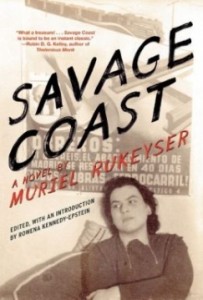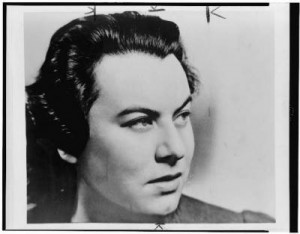Book Review: Rukeyser’s “Lost” Memoir Rediscovered
 In 1937, the young but already acclaimed poet Muriel Ruykeyser wrote an experimental literary work–Savage Coast—set at the outbreak of the Spanish Civil War that presents various unconventional relationships and international encounters of the revolutionary kind, represented with rich sensual imagery and woven with allusion as much to key political events as to female and male authors of the period. This newly rediscovered novel opens a window onto a young poet’s tangle with self, strangeness, commitment, and conviction.
In 1937, the young but already acclaimed poet Muriel Ruykeyser wrote an experimental literary work–Savage Coast—set at the outbreak of the Spanish Civil War that presents various unconventional relationships and international encounters of the revolutionary kind, represented with rich sensual imagery and woven with allusion as much to key political events as to female and male authors of the period. This newly rediscovered novel opens a window onto a young poet’s tangle with self, strangeness, commitment, and conviction.
The title Savage Coast takes the familiar geographical phrase “Costa Brava” and translates it literally—re-examing this stretch of map on Spain’s Mediterranean north coast, making it new, keeping with Modernist precepts of the period. Likewise, the narrative tells its story obliquely. The reader moves through passages deliberately fragmented, a literary montage that aims for (and for me, succeeds in) making small and large events come to us as in life, piecemeal, liquid, or shattering, aggregative, more often glimpsed than gazed-upon, but shaping us for our next changes.
This transparently autobiographical story turns Ruykeyser’s experience to poetically rendered fiction. A British magazine sent the author, then a fledgling reporter (like Helen, her 22-year-old protagonist) to cover the People’s Olympiad, which was scheduled in Barcelona for July 1936 to counter Hitler’s Berlin Olympics. The People’s Games never took place, overtaken by the outbreak of Franco’s uprising-soon-to-become-war. Helen falls in love with Hans, a German cabinet-maker and long-distance runner destined for the Games. The relationship is quickly formed, intelligently chosen, compelling, sexually fulfilling, and enormously important to the female protagonist–yet, unusual in fiction and film, then and now, as the love affair forms part of her storyline, but is not her entire raison d’être.
The novel remained unpublished–its frank sexual content met with savage rejection. Its discoverer and editor, Rowena Kennedy-Epstein, observes:
Written immediately upon her return from Spain in the autumn of 1936, the novel […] was brutally panned in her publisher’s rejection letter, from 1937, for being, among other things, “BAD” and “a waste of time,” with a protagonist who is “too abnormal for us to respect.” This is to say, the first critics of Savage Coast discouraged Rukeyser from writing the kind of large-scale, developmental, hybrid, modernist war narrative that she had begun—one that is sexually explicit, symbolically complex, politically radical, and aesthetically experimental—in favor of the gender-appropriate lyric poetry of her first book and the brevity of “small” personal narratives.
Most likely the book’s celebration of communist discipline and effectiveness in Barcelona, 1936, plus satirically deflating portraits of bourgeois tourists caught by an unexpected outbreak of “History,” contributed to the crushing rejection. The damning critique from her publisher would be the more damaging to the author, given the openly autobiographical nature of her narrative.
This season’s welcome publication of Savage Coast continues the Feminist Press project of recovering major narratives by women writers whose works have been obscured and written out of the mainstream literary record. Today Ruykeyser holds the mixed blessing-and-curse of a reputation as “a poet’s poet” (important, yes, but difficult and, well, you know, a bit odd). This must have been for her – and remains, for her admirers – starkly frustrating, because she strives everywhere to make language muscular, potent, and accessible, a vehicle for new vision that spurs social change. Smart writing depends on smart readers; brave writing, on brave readers. Read and seen attentively, her work achieves exactly what she wanted.
Poetry lovers and literary buffs, Hispanophiles, and the many interested in the Civil War should race to obtain this work. Readers of The Volunteer will find detailed socio-historical interest in what the book reveals about the first hours and days on the ground in Catalunya following the Franquista rebellion, as the nature of the uprising began to be known. This text sculpts a veering yet light-filled moment in which weightiest matters hang in balance. It brings new clarity to a major writer’s thinking and formation. For Ruykeyser, Spain was the place “I began to say what I meant.” The book likewise illuminates the central importance that the struggle in Spain held for creative thinkers around the world. As Ruykeyser remarked when a friend asked, “Why do you care about Spain so much? … It was so long ago”: “Going on now. Running, running, today.”
Ruykeyser lived her hybrid modernist esthetic and political convictions with rare consistency. Before such terms were current, she offered a truly embodied style, profoundly consistent with the body she inhabited and the experiences she lived. She was physically large, handsome rather than pretty, and her prose like her poetry refuses tidy boundaries or easy beauties. Socially, she was censured for bisexuality and unwed motherhood. By her example, we have a chance to live our own brilliant, messy, visionary lives more truly.
Amanda Powell is an acclaimed translator and senior instructor in the University of Oregon’s Department of Romance Languages. She is also a widely published poet.














[…] McKenzie Wark via Amy Scholder Feminst Press is really coming up some great stuff. Muriel! In Spain! Thank you Amy Scholder via Facebook https://albavolunteer.org/2013/09/review-rukeysers-lost-memoir-rediscovered/ […]